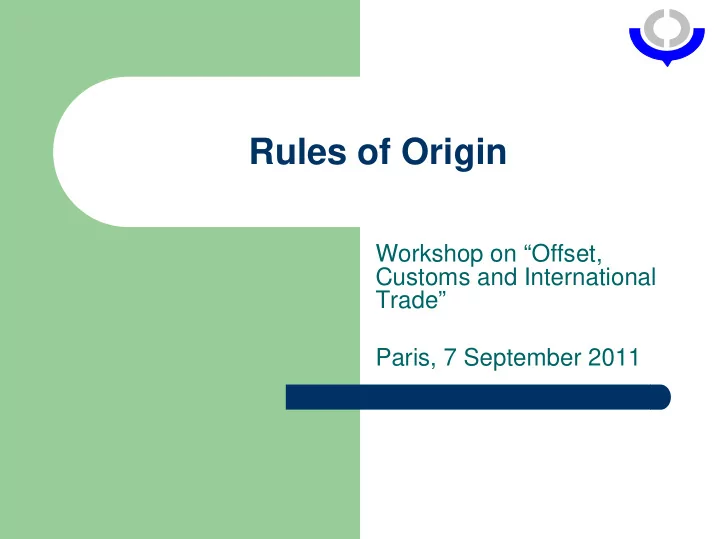

Rules of Origin Workshop on “Offset, Customs and International Trade” Paris, 7 September 2011
THE WCO, AN ORGANIZATION WITH GLOBAL REACH 177 Members divided into 6 Regions Members responsible for 98 % of world trade Europe Americas Asia Pacific ESA MENA WCA
KEY ACTIVITIES OF THE WCO • Developing international Customs Instruments such as the Harmonized System, the Revised Kyoto Convention, the Istanbul Convention, the Nairobi Convention, the Johannesburg Convention • Encouraging Uniform Application of Simplified and Harmonized Customs Systems and Procedures and the increased use of IT as well as the implementation of the WCO Data Model • Administering international instruments developed by other multilateral institutions such as the WTO Agreements on Customs Valuation and Origin, and the UN Convention on Containers
WCO work in origin � WTO Agreement on Rules of Origin – CRO in Geneva – TCRO in Brussels � Preferential Trade Agreements
Preferential rules of origin � Action Plan to improve the understanding and application of preferential rules of origin (2007) – Database of Preferential Trade Agreements – Comparative Study – Technical Assistance � Revenue Package Action Plan (2010) – Guidelines on verification and control
Database of free trade agreements
Agreements Topics Start Topic E Topic A Topic D Agreement Topic C Agreement A Topics Topic B Agreement A Agreement B Agreement C etc. Topic B Topic A Topic A Agreement A Agreement B Agreement C etc.
A new module of the Comparative Study - World Trends in Certification and Verification -
WTO Agreement on Rules of Origin � Implication issues – public procurement Articles 1, 2 nd para. and 2 d of the WTO Agreement on Rules of Origin � Origin criteria Wholly obtained Substantial transformation (changes the origin of imported raw materials, components etc.)
Economic impact of rules of origin � International trade � Comparative advantage � Investments � Industrial structure � Research and Development
Conflicts between offset and rules of origin � FTA signed to – enhance the commercial ties between 2 specific countries – enhance importation of a given good � Artificially created production � “Trade deflection” � Harm smaller local production as conditions are artificially changed � Distortion of competition
Recommend
More recommend